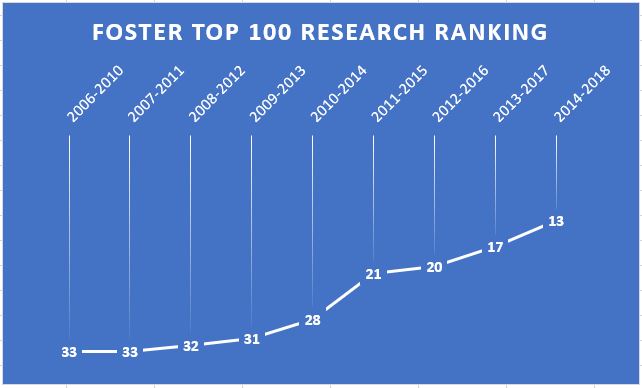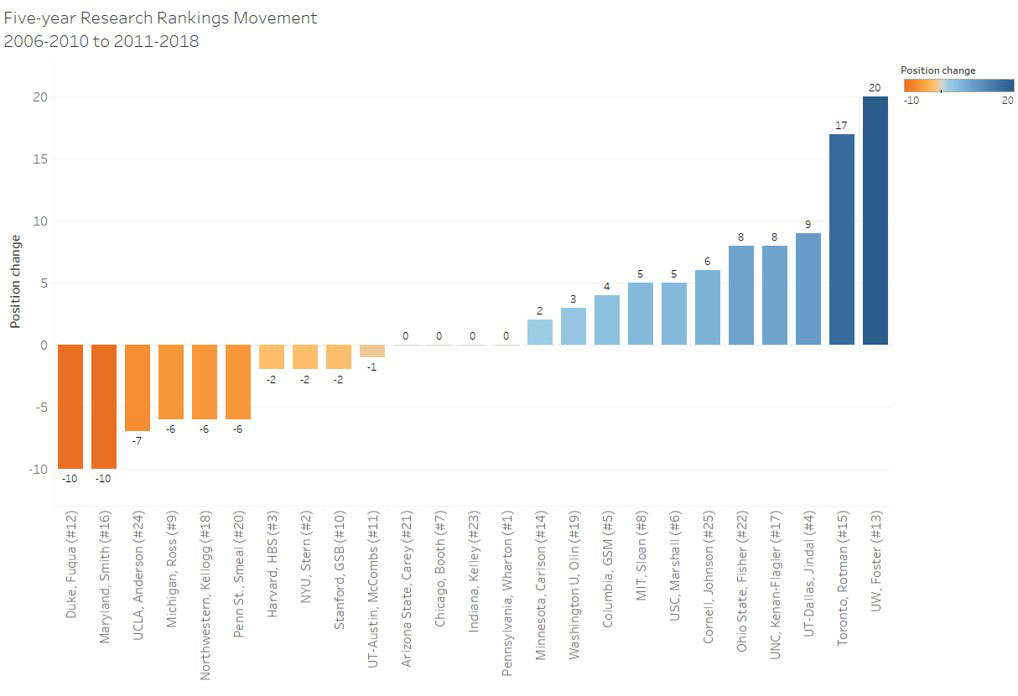One measure of Foster’s unparalleled climb in research productivity, over time
 In rankings of MBA and undergraduate programs, the reliance on soft or suspect measures and the ossified force of reputation generally result in precious little movement up or down the echelons.
In rankings of MBA and undergraduate programs, the reliance on soft or suspect measures and the ossified force of reputation generally result in precious little movement up or down the echelons.
In rankings of faculty research prowess, however, places tend to fluctuate considerably from one year to the next. Owing to the unpredictable nature of scholarly projects and the vagaries of the peer-review process, an explosion of publications might be followed by a decided lull.
A longer stretch of time provides a better gauge of an individual’s—or an entire faculty’s—ability to produce relevant, world-class research.
Research over time
The “Top 100 Business School Research Rankings” does just that. This index, published annually by the University of Texas at Dallas, tabulates the total number of publications attributed to each school’s faculty in 24 top journals representing every business discipline. And it calculates productivity in these elite journals in individual years and across five-year intervals.
Over the past five years, the research faculty of the University of Washington Foster School of Business has been a fixture in the top 20 of North America by this measure—toggling from #12 in 2014 to #10 in 2015 to #18 in 2016 to #4 in 2017 to #19 in 2018.
In the aggregate of those years—2014 to 2018—Foster ranks #13.
Trending (way) up
A look back even farther across these five-year snapshots in the Top 100 Business School Research Rankings offers a revealing perspective on research momentum.
Across the past dozen years, the data on Foster paints a picture of an unprecedented—and unparalleled—climb. Foster has marched steadily upward from #33 to #13 today.
Biggest movers
To put Foster’s upward mobility into context, a climb of 20 spots in this research ranking since 2006 is unparalleled in the United States. The next biggest advancer is the University of Toronto, which advanced 17 places over the same period, then it drops off precipitously from there. Here are the current top 25 research faculties, in order of their movement from the 2006-2010 ranking to the 2014-2018 ranking.
Could Should be higher
Xiao-Ping Chen, the associate dean for faculty and academic affairs at the Foster School, believes that Foster would likely rank even higher in the UT-Dallas index if it included a more complete set of A-list journals.
For instance, the ranking tallies papers in five management and organization journals, but does not count publications in the Journal of Applied Psychology, Personnel Psychology and Organizational Behavior and Human Decision Processes. Foster’s Department of Management and Organization fields numerous experts in the important areas of organizational behavior and human resources who publish frequently in these top-tier journals.
Likewise, the UT-Dallas ranking omits two major accounting journals—Contemporary Accounting Research and Review of Accounting Studies—in which Foster research often features.
And the ranking’s three finance journals leave out Foster’s own Journal of Financial and Quantitative Analysis, which is widely considered the fourth top-tier journal in the field.
Earlier this year, Financial Times listed Foster #7 in the world—and #1 among public universities—for research productivity in a more comprehensive set of 50 top business journals.
Why Foster?
Despite its limitations as a comprehensive ranking of faculty productivity, the UT-Dallas ranking still reveals a remarkable ascent by the Foster faculty over the past decade and change.
Chen ascribes this strong, steady growth in research production to several factors. They include a boom in hiring since 2005, coupled with a philosophy of raising the bar with ever new hire. This has been fueled by an infusion of private giving to support faculty, facilities and students at the Foster School. And it has resulted in a faculty that skews young, brilliant and hungry.
“I’d add one other reason for our growth in research,” says Chen, the Philip M. Condit Endowed Chair in Business Administration and a professor of management. “That is the Foster culture that is collaborative, supportive, transparent and fair. This is what has not only attracted many top talents but also retained them.”


